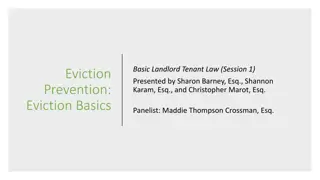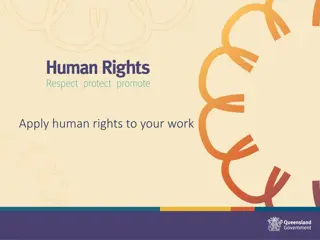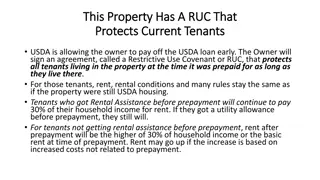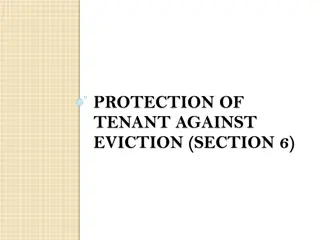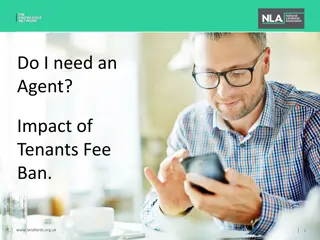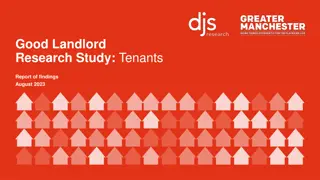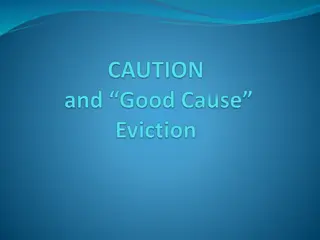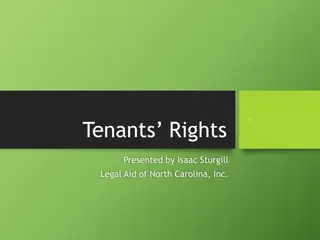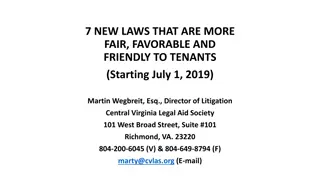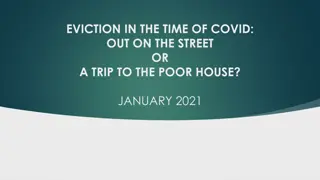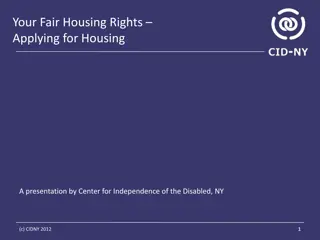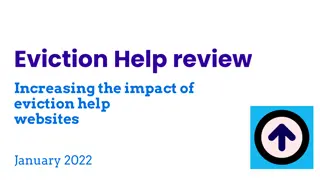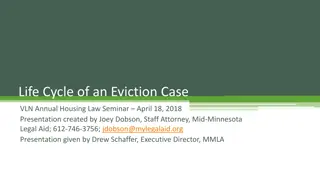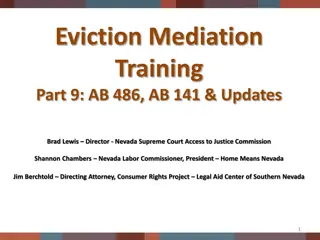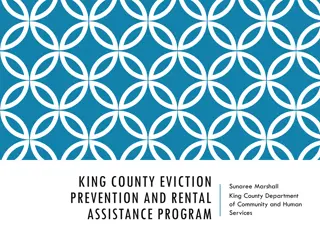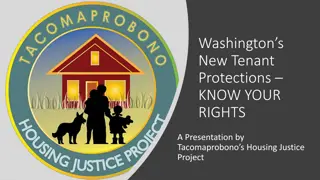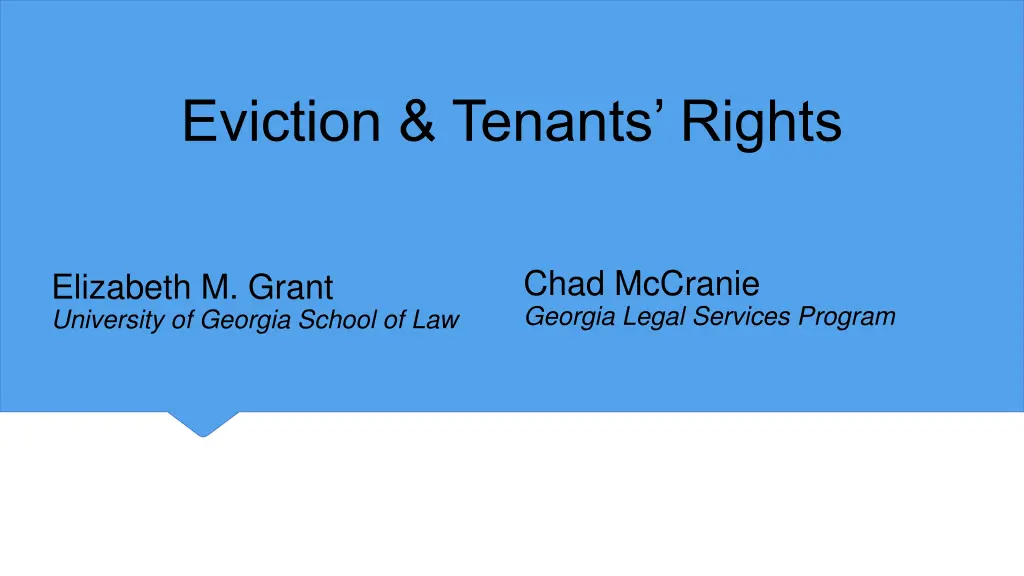
Understanding Tenants' Rights and Eviction Processes in Georgia
Gain insights into tenants' rights and eviction processes in Georgia, covering topics such as who qualifies as a tenant, landlords' obligations, reasons for eviction, defense strategies, and legal nuances during the pandemic.
Download Presentation

Please find below an Image/Link to download the presentation.
The content on the website is provided AS IS for your information and personal use only. It may not be sold, licensed, or shared on other websites without obtaining consent from the author. If you encounter any issues during the download, it is possible that the publisher has removed the file from their server.
You are allowed to download the files provided on this website for personal or commercial use, subject to the condition that they are used lawfully. All files are the property of their respective owners.
The content on the website is provided AS IS for your information and personal use only. It may not be sold, licensed, or shared on other websites without obtaining consent from the author.
E N D
Presentation Transcript
Eviction & Tenants Rights Chad McCranie Georgia Legal Services Program Elizabeth M. Grant University of Georgia School of Law
Todays Session Landlord-Tenant law basics Eviction process Covid-19 and evictions Special issues: Domestic violence victims Repairs Security deposits Legal resources Q & A
Who is a Tenant? Who is a Tenant? Tenants are - Someone with an agreement with owner to possess the property Agreement can be written or oral Tenants without a lease - Called a tenant at will Landlord can end agreement with 60 days notice (tenant only needs 30) or earlier for nonpayment of rent
Tenants Rights Tenants Rights NOTE Some of these rights can be waived in leases for non- residential property Right to Court Process Before an Eviction Called a dispossessory suit in Georgia Self-help evictions are ILLEGAL Landlord cannot: lock out the tenant turn off utilities do anything else to force the tenant out before obtaining an order for eviction from a court
Eviction 3 Main Reasons a Landlord Can File An Eviction: Nonpayment of Rent Lease has ended Termination of the lease
Defenses To Eviction Defenses To Eviction Tender Defense - Payment of rent plus court costs Normally must be done within 7 days of service Retaliation for asking for repairs will not stop eviction for nonpayment of rent Discrimination Based on race, sex, disability, religion, familial status. Partial Payment Termination not proper/valid under lease Failure to repair: damages larger than amount of rent owed If any rent remains owed, tenant will still be evicted
NOT Legal Defenses Under GA Law Financial hardship or unemployment Hospitalization or illness Security deposit does not count toward unpaid rent
Evictions During the Pandemic Evictions During the Pandemic Georgia Supreme Court Judicial Emergency Order Temporarily shut down courts, limiting them to essential functions (health, safety) Most courts did not consider evictions essential Emergency orders ongoing, but non-essential cases resumed in July Emergency created a significant backlog for some courts CARES Act eviction moratorium Only for certain properties (federally subsidized, federally backed mortgages) Also prohibited late fees for a few months Expired in July 2020
Evictions During the Pandemic Evictions During the Pandemic CDC Moratorium CDC Moratorium CDC issued order in September under emergency authority Any tenant who submits a declaration to their landlord is protected from eviction until the order expires Extended by Congress to January 31, 2021. Recently extended by the CDC to March 31, 2021. Tenant continues to owe all rent and late fees. Entitled to protection if submitted to the landlord any time before tenant is physically evicted Declaration must state: Unable to pay rent due to loss of income/hours/wages or significant medical expenses Attempted to obtain government assistance for rent Below certain income threshold Attempted to make partial payments as able Would become homeless or would have to move in with others if evicted
The Eviction Process Landlord will file a dispossessory, usually in Magistrate Court Sheriff will serve court papers Including a summons & complaint Service Personal, or Tack and mail Notice or demand to vacate from the landlord is not the court summons
Tenants Answer Tenant s Answer Answer must be filed within 7 days of being served Calendar days, not work days Weekend days count Filed at courthouse usually no e-filing in Magistrate Ct. Most courts have forms tenant can use to admit or deny each reason in the landlord s complaint. If tenant does not raise a defense in the answer, that defense might not be considered at the court hearing.
What Happens Next No answer filed or answer is late - Default judgement - LL will get a writ of possession Writ of possession allows Sheriff to evict tenant Money judgement possible if tenant was personally served or answered tack and mail service If timely answer is filed - Court will be scheduled within 7 days possibly later during pandemic Very unlikely court date will be continued
At the Hearing At the Hearing Judge may ask parties to discuss settlement. A mediator might be available in some counties. Tenant must have evidence or witnesses (if any) at the hearing Judge will probably announce decision in court Writ of possession - Sheriff can evict as soon as 7 days Tenant may appeal within 7 days but has to pay court judgment (back rent, late fees. etc.)
Tenants Behind on Rent Tenants Behind on Rent Act before dispossessory is filed. Access emergency rent assistance. Try to renegotiate lease terms with LL and develop a payment plan in writing. Use the CDC declaration if eligible to delay (not stop) eviction LL has the option (not required) to withdraw writ and allow tenant to stay if tenant catches up before writ executed. Get legal advice or representation if eligible.
Victims of Domestic Violence Victims of Domestic Violence Additional Remedies Additional Remedies Tenant may be able to file a petition for a temporary protective order (TPO) Acts of family violence: any felony, battery, simple assault, etc. Between spouses, parents of same child(ren), parent-child, living or formerly living together, etc. See O.C.G.A. 19-13-1 TPOs allow a judge to: order immediate eviction of the abuser order the abuser to continue rent and utility payments forbid the abuser from disconnecting utilities A Judge cannot change the terms of the lease. order the landlord to do anything or not to do something otherwise permitted
Lease Termination for Victims Lease Termination for Victims Early lease termination O.C.G.A. 44-7-23 If the tenant has a protective order or if the abuser is arrested, The tenant can terminate the lease early without penalty. Tenant must give the landlord 30 days written notice and A copy of the protective order or the bond conditions for the abuser Must continue to pay rent during the 30-day notice
Repairs & Retaliation Repairs & Retaliation Tenant s Right to Repairs Landlord must make necessary repairs within a reasonable time after getting notice of the issue A residential lease CANNOT waive this obligation Tenants may have a legal claim against landlords who violate this duty Landlords may also be subject to fines for violating housing codes This does NOT mean tenants have the right to withhold rent
Failure to Make Repairs Failure to Make Repairs - - Tenant s Remedies Tenant s Remedies If Landlord fails to make repairs within a reasonable time, tenant can: Repair and Sue tenant can pay for repairs and sue landlord for reimbursement Repair and Deduct tenant can pay for repairs and deduct cost of repairs from rent Risky landlord could file eviction for nonpayment of rent, and court will decide if tenant used defense properly Tenants should give plenty of notice to landlord both of the issue and of intent to repair and deduct Claim for Damages make no repairs and make claim for damages arising out of failure to repair Diminution in value - difference in rent paid vs. actual value of property in current condition If raised as a counterclaim in an eviction case for nonpayment of rent, tenant must prove MORE damages than rent owed to prevent eviction Court probably will not decide that property was worth $0, especially if tenant is still living in property
Failure to Make Repairs Failure to Make Repairs add l add lTenants Remedies Tenants Remedies Constructive Eviction tenant moves out and argues they do not owe further rent Argument = action or inaction of landlord effectively evicted the tenant because the property is uninhabitable or unsuitable for living Fact specific Cosmetic or conditions that are merely uncomfortable are not uninhabitable Call Code Enforcement
Retaliation Retaliation GA law now protects tenants against retaliation from a landlord when tenant requests repairs or call Code Enforcement. O.C.G.A. 44-7-24 Allows tenant to bring claim against landlord for one month s rent plus $500 Successful claim also acts as a defense to an eviction May be retaliation if landlord within 3 mos. of request to repair/call to code enforcement: Files an eviction or terminates the lease Deprives tenant of possession illegally Decreases services to tenant Increases the rent, or Otherwise materially interferes with tenant s rights under the lease
Retaliation (cont) Retaliation (con t) Landlord is not liable when: Rent increase is pursuant to an escalation provision in the lease Rent increase is made pursuant to rules for a subsidized housing program Rent increase or deduction in services is part of a pattern applicable to all tenants in a complex Eviction is for nonpayment of rent The tenant is being evicted for unrelated lease violations or for damaging the property or threatening the health and safety of the landlord or other tenants The tenant holds over after the tenant gives notice of termination or intent to vacate The tenant holds over after the landlord gives notice of termination at the end of the rental term as agreed upon in the written lease. *Landlord also has a rebuttable defense if the property has been inspected within the last 12 months by code enforcement, a licensed building inspector, or by another federal, state, or local program that certifies that the property complies with applicable building and housing codes
Security Deposits All landlords must: Return the security deposit within 30 days of move-out, but may retain amounts to cover: Damages caused by the tenant beyond normal wear and tear Any rent or other fees validly owed by the tenant Provide the tenant with a written statement explaining the reasons $ was deducted from security deposit Landlords CANNOT charge tenants for normal wear and tear Even if damage is beyond normal wear and tear, tenant should only be charged for value of damages minus cost attributable to normal wear and tear
Security Deposits (cont) Certain landlords must follow additional rules: Properties owned by a company Properties owned by an individual if the individual + immediate family own 10+ rental properties Any property managed by a third party for a fee (property management company, etc.) These landlords must: Before move in, give the tenant a written list of any existing damage to the unit and give the tenant the opportunity to inspect the unit to make sure the list of damages is correct. Deposit the security deposit in a bank account and inform the tenant in writing of its location or post a bond with the superior court. After a tenant moves out, the landlord should inspect the unit and make a list of any damage to the unit and the dollar value of such damage. Within five business days after moving out of the unit, the tenant has the right to inspect the unit to determine if the list of damages is correct.
Legal resources for tenants Legal resources for tenants Counties outside Metro Atlanta: Georgia Legal Services Program 1-833-GLSPLAW (or 1-833-457-7529) https://glsp.org Housing, unemployment, public benefits, domestic violence & school discipline. For cases in Metro Atlanta Atlanta Legal Aid: https://atlantalegalaid.org Fulton, DeKalb, Cobb, Gwinnett, Clayton Housing, consumer law, domestic violence, health law programs, senior hotline Atlanta Volunteer Lawyers Foundation: 404-521-0790 or https://avlf.org UGA School of Law Public Interest Practicum 706-542-5213 - provides general information/no direct representation
Resources for Tenants Behind on Rent Resources for Tenants Behind on Rent Call 2-1-1 Service run by United Way Can provide tenant with list of local agencies who might provide rental assistance CDC Moratorium Info and Declaration Form https://www.cdc.gov/coronavirus/2019-ncov/covid-eviction-declaration.html Online CDC Form Generators Example: https://www.covid19evictionforms.com/ Benefits: Often let the tenant e-sign the form Often generate a letter to send to the landlord along with the form Drawbacks: Often the declaration form generated by these sites is not the official CDC form (not required, but many courts and sheriffs have come to expect it, especially the OMB Control No.)
General information about landlord/tenant law General information about landlord/tenant law Georgia Legal Aid has pamphlets and FAQs on a variety of legal topics (LL/T law and others) https://www.georgialegalaid.org/ Georgia Landlord-Tenant Handbook Published by Georgia Department of Community Affairs https://www.dca.ga.gov/node/2945
Questions? Questions? THANK YOU!

